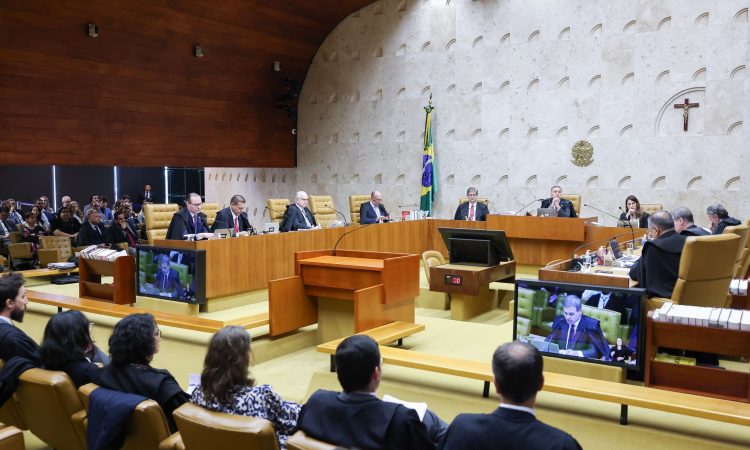
The Federal Supreme Court (STF) defined, this Wednesday (18), the rules for the retroactive application of the agreement in which the accused confesses to the crime and is released from prison by complying with certain measures.
The so-called non-criminal prosecution agreement (ANPP) allows the person being investigated to sign a term in which they acknowledge their guilt and undertake to comply with certain conditions (such as paying a fine or providing services) so as not to be arrested.
The instrument emerged with the approval of the anti-crime package law in 2019.
What does the ANPP look like after the decision?
According to the STF’s decision, the agreement may be applied to benefit defendants and convicts in criminal cases still open (without a final conviction), on the date the law came into force.
How many ANPPs are there currently?
According to data from the National Council of Justice (CNJ), there are around 1.7 million cases in the Judiciary in which the application of the ANPP can be evaluated. The majority (1.57 million) are in the first instance.
The ANPP only applies to crimes committed without violence or serious threat and with a minimum sentence of less than four years.
Rules
According to the thesis approved by the STF, the ANPP can be concluded in cases of ongoing proceedings at the time of entry into force of the anti-crime package (January 23, 2020).
The agreement can be concluded even if, until then, the defendant has not confessed. This applies as long as the process has not yet been closed.
The jurisdiction to validate the agreement will lie with the court in which the case is.
It will be up to the respective Public Ministry to evaluate and offer the ANPP, if deemed appropriate. The request may also be made at the request of the defense or at the request of the judge.
The statement regarding the agreement must be made in the process at the first opportunity in which the MP speaks in the case.
For investigations or criminal actions initiated from now on, the ANPP proposal by the Public Prosecutor’s Office (or the manifestation for its non-offer) must be presented before receiving the complaint.
The possibility of a reservation for offering ANPP during the course of criminal proceedings was established, “if applicable”.
The thesis approved by the ministers was the following:
“It is the responsibility of the officiating member of the Public Prosecutor’s Office, motivated and in the exercise of their power-duty, to evaluate the fulfillment of requirements for negotiation and celebration of the ANPP, without prejudice to the regular exercise of jurisdictional and internal controls.
It is possible to conclude the ANPP in cases of ongoing proceedings, when law 13964/2019 comes into force, even if there is no confession from the defendant until that moment, as long as the request was made before the decision was made.
In criminal proceedings in progress on the date of proclamation of the result of this trial in which in theory it is appropriate to conclude an ANPP, if it has not yet been offered or there was no reason for its offering, the Public Prosecutor’s Office, acting ex officio, at the request of the defense , or upon provocation by the magistrate in the case, must, at the first opportunity in which he speaks in the case, after the publication of the minutes of this trial, express himself and with motivation about the appropriateness or not of the agreement.
In investigations or criminal actions initiated after the announcement of the result of this trial, the proposal of ANPP by the Public Prosecutor’s Office or the reason for not offering it must be presented before receiving the complaint, except for the possibility of proposal by the ministerial body during the course of the criminal action, if applicable.”
Discussion
Analysis of the case began in . The trial resumed on August 7, in the physical plenary.
The approved thesis was prepared based on a proposal from the rapporteur, Minister Gilmar Mendes, with contributions from other ministers.
In the discussion on the thesis, Moraes presented reservations regarding the reservation so that the MP can propose the agreement during the course of the criminal action, for processes already opened under the anti-crime law.
During the trial, the group that gathered the most votes was that of the rapporteur, minister Gilmar Mendes.
The judge voted so that the ANPP can be applied retroactively in all cases in which the so-called final judgment did not occur (i.e., open cases, in which there is no definitive conviction).
He was followed by Edson Fachin, Dias Toffoli, Luís Roberto Barroso, Cristiano Zanin, André Mendonça and Nunes Marques.
There were disagreements regarding when the request for the ANPP should be made.
Cristiano Zanin, for example, argued that there must be a specific time frame for this.
Alexandre de Moraes, Cármen Lúcia and Flávio Dino voted so that the ANPP can be applied in a more restrictive way.
For them, it is only possible to request an agreement as long as there is no conviction against the defendant in the case and if the request was made by the defense at the first opportunity to appear in the case.
Specific case
The discussion in the Court was made in a habeas corpus presented by the defense of a man convicted in 2018 of drug trafficking.
He was arrested red handed with 26 grams of marijuana. He was sentenced by the Court of Justice of the Federal District and Territories (TJ-DFT) to a sentence of 1 year and 11 months in prison.
At the STF, the defense argued that the man must be guaranteed the possibility of signing the ANPP.
In this specific case, by majority, the ministers suspended the conviction until the Public Prosecutor’s Office expresses its opinion in the process on whether it is viable to reach an agreement.

